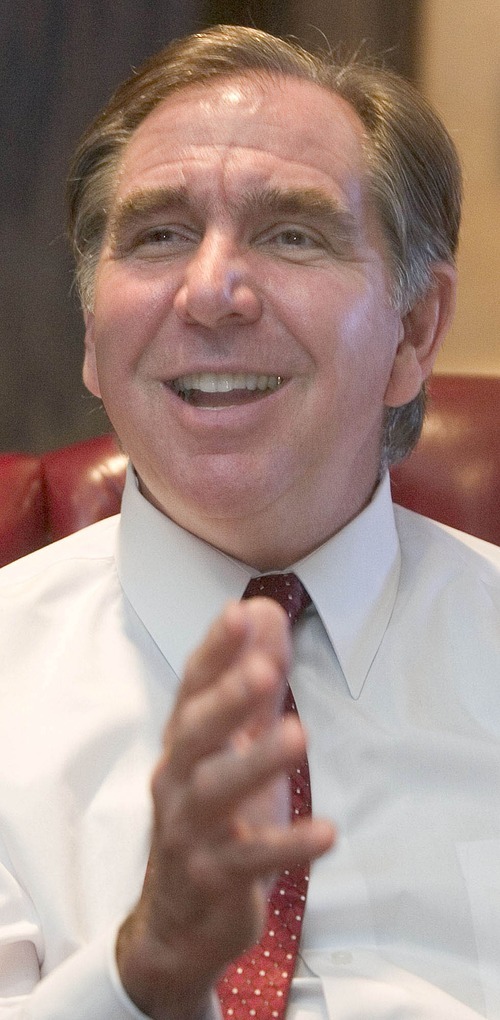This is an archived article that was published on sltrib.com in 2011, and information in the article may be outdated. It is provided only for personal research purposes and may not be reprinted.
Provo • Mormons, says University of Utah President Michael Young, ought to be "among the most passionate civil libertarians in the world" to preserve religious freedoms.
"We all ought to be members of the ACLU," Young said Monday in a question-and-answer session after addressing the LDS International Society at Brigham Young University during a conference on the erosion of religious liberties.
The U. president, a special adviser to leaders of the Utah-based Church of Jesus Christ of Latter-day Saints on religious-liberty issues, served from 1998 to 2005 on the U.S. Commission on International Religious Freedom, including two stints as chairman.
In his keynote address, Young, a Latter-day Saint and a descendant of Utah colonizer Brigham Young, detailed what he sees as attacks on religious freedoms and called for individual LDS Church members to pay attention. Often, he noted, it's zoning boards or city councils that make decisions that impinge on religious liberties.
"Our capacity to stem the tide, to raise the alarm and do what we need to do for our church, but also for people everywhere, is important," Young told a crowd of about 200 conference-goers.
Karen McCreary, executive director of the American Civil Liberties Union of Utah, was surprised and delighted by Young's comments that Mormons should join the ACLU.
"I really welcome it," said McCreary, who noted that the Utah chapter was founded by Latter-day Saints. "It's wonderful to see that the health of my liberties are connected to the health of yours, whether you are LDS, or Jew or Muslim or nothing in this state. It's great to have a conversation."
She noted that the ACLU in 2009 staged a series of public dialogues about religious liberties and gay rights after the LDS Church played a leading role in passage of California's Proposition 8 ban on same-sex marriage.
Public forums also took place after the ACLU sued over free-speech restrictions the LDS Church placed on the faith's Main Street Plaza in downtown Salt Lake City.
Because the ACLU takes on government when it appears to endorse one religion over others — such as when a city allows placement of a Christian cross on public property — it sometimes is perceived as anti-religion, McCreary said.
But that's not the case, she added, noting that the ACLU in other states has represented Mormons who don't want to be forced to pray in a particular way at school, or who want to retain their scholarships while serving missions.
The Utah chapter of the ACLU has Mormon members, but McCreary said it's not something the chapter tracks.
In his comments Monday, Young did not discuss the areas in which the LDS Church and ACLU likely would differ — including some gay rights initiatives — but he stressed the importance of Mormons forming alliances with other faith-based groups and civil-liberties organizations.
"I'm always struck," he said, "by the extent to which freedom of religion is so profoundly connected to other civil liberties."
As Mormons find allies among civil libertarians, Young said, "we would need to carry our half of the burden, which means we need to be better champions of civil rights more broadly and human rights more broadly."
"We need to do this very much for the right reasons," he added, "not just to save the world for Mormon missionaries, as laudable and important as that is."
Other conference highlights
The erosion of religious liberties, a topic mentioned frequently by LDS general authorities in recent years, was the topic of Monday's 22nd annual conference of the LDS International Society.
Among the highlights:
• Although a minority of countries have restrictions on religious freedoms, they hold 70 percent of the world's population, said John Graz, secretary-general of the International Religious Liberty Association.
• The IRLA, Graz said, has identified the religious groups most likely to be "scapegoated" for problems in the coming years as Christians in the Middle East and Asia; Muslims in the United States; and religious minorities and evangelical Christians everywhere.
• Hannah Clayson Smith, a BYU law graduate and senior counsel for The Becket Fund for Religious Liberty, identified two trends to watch: the battle over the right of religions or religious people to be exempt from discrimination laws and the right of conscience for health care providers.
• She said the U.S. Supreme Court has agreed to hear what will be a "landmark" case concerning a religious group's right to hire or fire ministers. She said the Michigan case involves a Lutheran school, which fired a teacher who was also a minister.



